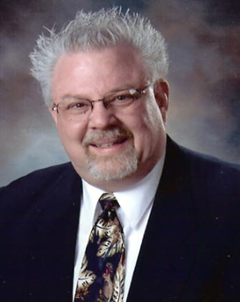ISU professor Peterson receives Assistive Technology Professional certification
February 13, 2009
Ted Peterson, Idaho State University clinical assistant professor in the Department of Physical and Occupational Therapy, has earned the Assistive Technology Professional (ATP) certification by the Rehabilitation Engineering and Assistive Technology Society of North America, (RESNA).
RESNA is the nation’s leading organization that serves people with disabilities seeking technology applications to maximize their ability to function in their home, school and/or work environment.

A trained assistive technology professional analyzes the needs of individuals with disabilities, assists in the selection of the appropriate equipment and trains the consumer on how to properly use the specific equipment.
The Assistive Technology Professional (ATP) certification recognizes professionals who have reached an internationally accepted standard of knowledge in assistive technology and who demonstrate a commitment to provide only the highest ethical standards of practice.
To become certified as an Assistive Technology Professional, one has to meet three requirements: eligibility through work and education, a rigorous exam that tests competency in the field of assistive technology and an ongoing commitment to practice the highest ethical standard.
RESNA has a process to review any violations of these standards, which can be reported to the professional standards board.
Peterson is an occupational therapist who is in his first year of teaching in the ISU master of occupational therapy program, after a successful career in direct provision of occupational therapy services and management of multidisciplinary rehabilitation programs.
He and his wife Barbara, also an occupational therapist, live in Pocatello.
“Most candidates find that the certification process itself is highly valuable,” said Anjali Weber, MS, ATP and Director of Certification, RESNA. “The application, work experience and comprehensive examination are an excellent evaluation of their commitment to the field, and the requirement to abide by the RESNA Standards of Practice and Code of Ethics help assure that individuals with assistive technology needs will be offered quality service.”
To earn ATP Certification, Dr. Peterson had to demonstrate an understanding of the main principles of assistive technology including psychology and sociology; human anatomy, physiology, kinesiology and biomechanics; basic etiologies and pathologies; learning and teaching; assessment procedures; service delivery systems and funding for assistive technology; design and product development; product knowledge of assistive technology devices; integration of person, technology and the environment and professional conduct.
“We see certification as an integral part of RESNA’s commitment to the education of its members and the development of the assistive technology profession in general,” said RESNA past-president Glenn Hedman, MS, PE, ATP, RET.
There are almost 4,000 rehabilitation engineers, occupational therapists, physical therapists, speech and language pathologists, suppliers, educators and other professionals who have successfully received their certification.
For more information on the ATP certification, visit www.resna.org.
Categories:
